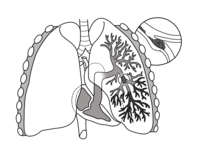
Photo from wikipedia
BACKGROUND Data describing the association of preoperative pulmonary function testing (PFT) with postoperative pulmonary complications (PPC) are inconsistent. We conducted this prospective study to determine the ability of PFT to… Click to show full abstract
BACKGROUND Data describing the association of preoperative pulmonary function testing (PFT) with postoperative pulmonary complications (PPC) are inconsistent. We conducted this prospective study to determine the ability of PFT to predict PPC. MATERIALS AND METHODS Data were prospectively collected from 676 patients who underwent elective abdominal surgery (emergency and thoracic operations excluded). The primary outcome was the occurrence of PPC within 30 days. Patient and procedure-related factors were examined as risk factors. Multivariate logistic regression analysis was performed using risk factors identified with univariate analysis and area under the curve (AUC) analysis performed. RESULTS PPC occurred in 29 patients (4.9%). History of smoking or abnormal physical examination were not significantly associated. Multivariate analysis identified age (p=0.03), operative time (p=0.02), blood transfusions (p=0.002), and %VC (p=0.001) as significant risk factors. AUC with a model including age, operative time, and blood transfusion was 0.83. The addition of %VC to these three variables increased the AUC to 0.89 (p=0.1). CONCLUSIONS Age, operative time, blood transfusion, and %VC are significantly associated with an increased risk of PPC. The addition of %VC to other risk factors did not significantly improve the ability to predict PPC, showing that preoperative PFT is not helpful to predict PPC.
Journal Title: International journal of surgery
Year Published: 2019
Link to full text (if available)
Share on Social Media: Sign Up to like & get
recommendations!